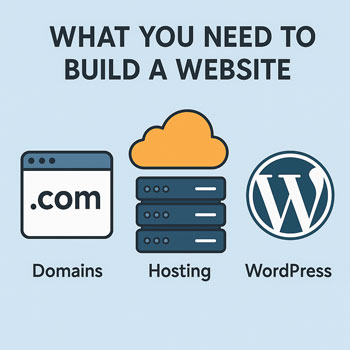
What You Need to Build a Website (Domains, Hosting, WordPress)
Module: Website Setup & WordPress Basics • Lesson: What You Need to Build a Website
This lesson introduces the three core components required to launch any WordPress website: a domain name, web hosting, and the WordPress software itself.
Understanding Domain Names
A domain name is your website’s online address (example: yourbrand.com). It’s what users type into their browser to visit your site.
Key Domain Components
- TLD (Top-Level Domain): The extension, such as .com, .org, .net, .io, or .co.
- Second-Level Domain: The main portion of your domain (e.g., yourbrand).
- Registrar: The company where you purchase and manage your domain (e.g., Namecheap, GoDaddy, Google Domains).
Domain Best Practices
- Short and easy to spell
- No unnecessary hyphens or numbers
- Brandable and memorable
- Preferably a .com (when available)
- Check social media availability for consistency
Understanding Web Hosting
Web hosting stores your website files and makes them publicly accessible. When someone visits your domain, hosting delivers the pages to their browser.
Common Hosting Types
- Shared Hosting: Beginner-friendly, affordable, multiple websites sharing server resources.
- VPS Hosting: More resources and control; scalable for growing websites.
- Managed WordPress Hosting: Performance-optimized hosting with automated updates and security.
- Cloud Hosting: Scalable hosting on distributed infrastructure; flexible and powerful.
- Dedicated Hosting: Entire physical server dedicated to your website; enterprise-level needs.
Features to Look For
- Free SSL certificate
- Automatic backups
- Fast server technology (LiteSpeed, NGINX, or similar)
- 1-click WordPress installation
- Responsive support
- Staging environments (for testing changes)
How Domains & Hosting Work Together
Your domain is the address. Your hosting is the home. WordPress is what runs your website inside that home.
When someone types your domain name:
- DNS directs the visitor to your hosting server.
- Your server loads your WordPress website files.
- The visitor sees your website in their browser.
WordPress.org vs WordPress.com
Both platforms use the WordPress software, but they differ in flexibility and control.
| Feature | WordPress.org (Self-Hosted) | WordPress.com (Hosted) |
|---|---|---|
| Hosting | You choose and pay for your hosting provider. | Hosting included; all-in-one service. |
| Customization | Full access to themes, plugins, and code. | Limited on free plans; extended features on paid plans. |
| Maintenance | You handle updates, backups, performance & security. | Managed for you on most plans. |
| Best For | Businesses, blogs, portfolios, and custom sites. | Hobby sites or users who want a simple, managed solution. |
Bottom Line: Choose WordPress.org for maximum freedom. Choose WordPress.com if you prefer simplicity and don’t need deep customization.
Checklist: What You Need Before Building
- ☐ A domain name (e.g., yourbrand.com)
- ☐ A hosting plan (shared, VPS, managed WP, or cloud)
- ☐ SSL certificate (usually free from the host)
- ☐ Access to your registrar’s DNS settings
- ☐ Admin email address you can access
- ☐ (Optional) Professional email accounts for your domain
Activity: Compare Three Hosting Providers
Goal: Choose a hosting provider that matches your needs for performance, support, and budget.
- Choose three hosting providers (example: Bluehost, SiteGround, Hostinger, WP Engine).
- Visit each provider’s pricing and hosting features page.
- Compare:
- Intro & renewal pricing
- Speed & uptime guarantees
- SSL, backups, staging availability
- Support quality
- Ease of WordPress installation
- Decide which provider you would choose and explain why.
Comparison Table (Paste Into Your Notes)
| Feature | Provider A | Provider B | Provider C |
|---|---|---|---|
| Price (Intro / Renewal) | |||
| Hosting Type | |||
| Performance Features | |||
| SSL & Backups | |||
| Support Quality | |||
| Ease of Setup | |||
| Total Score |
